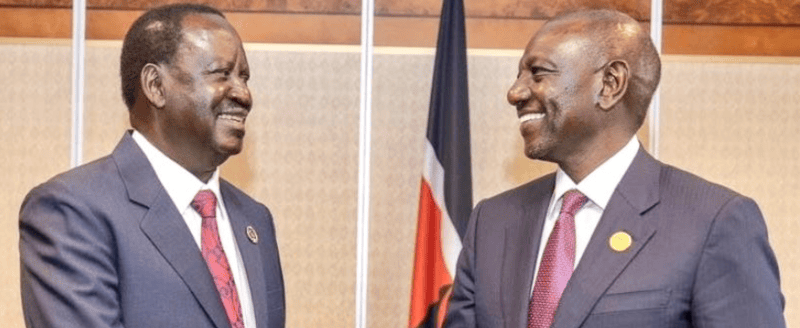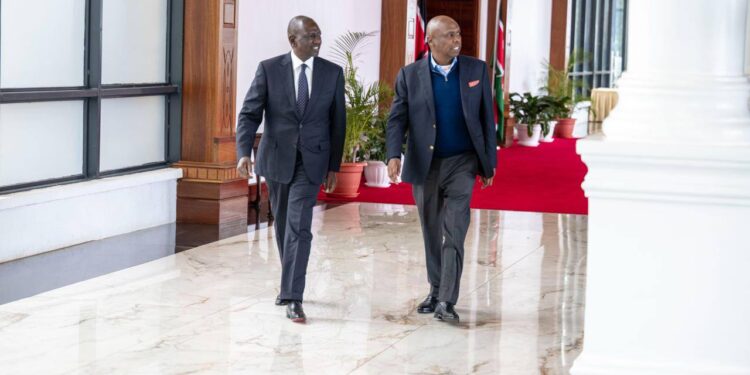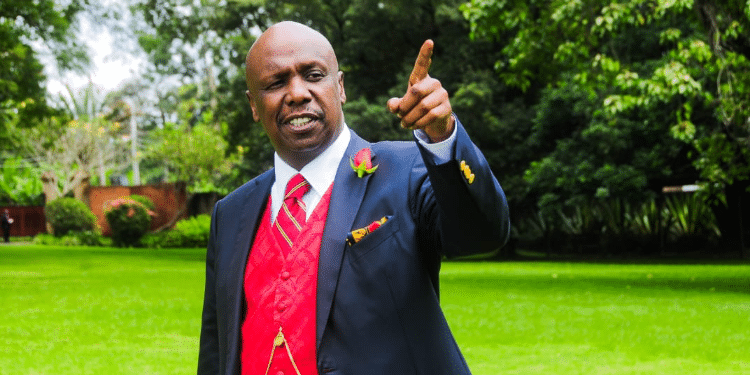
ODM leader Raila Odinga (left) and President William Ruto. Photo/Eastleigh Voice
By Wanderi Kamau
A significant majority of Kenyans are against the formation of a broad-based government (BBG) between President William Ruto and ODM leader Raila Odinga, according to a new survey released by research firm Trends and Insights for Africa (TIFA) on Wednesday, May 28, 2025.
The poll shows that 54% of Kenyans oppose the idea of a BBG, which has been touted as a political collaboration meant to promote national unity and inclusivity. Only 22% of respondents expressed support for the initiative, while 25% said they had no opinion on the matter.
The BBG, which has been a subject of national debate since Ruto and Raila signaled intentions to work together, is being viewed by critics as a move that undermines the role of the opposition and diminishes accountability in governance.
“The findings reveal widespread public skepticism about the political alliance between President Ruto and former Prime Minister Raila Odinga,” said TIFA lead researcher, who noted that the support for the BBG remains far lower than either leader might have anticipated.
Mixed views on Raila’s political future
The survey also explored public expectations about Raila Odinga’s political role ahead of the 2027 general elections. The results reveal a fragmented opinion landscape.
According to the poll, 28% of respondents believe that Raila should rejoin the opposition and contest the presidency himself. Another 18% think he should return to the opposition but back a different candidate. In contrast, 23% support the idea of Raila backing President Ruto’s re-election bid. A further 14% think Raila will retire from active politics and play no role in the upcoming elections, while 16% remain undecided.
Read more:Is Raila starting to dump Ruto?
These numbers suggest uncertainty surrounding Raila’s future, despite his long-standing presence in Kenya’s political scene. His growing closeness to the Ruto administration, including support for the BBG and involvement in regional and continental initiatives, has sparked speculation about whether he is preparing to exit the local political arena or re-strategizing for 2027.
Kenyans divided over country’s direction
The TIFA survey also tracked public sentiment regarding the direction in which the country is heading. Notably, the data shows a sharp rise in optimism since September 2023.
In May 2025, 75% of respondents said Kenya is heading in the right direction — a significant increase from just 36% in September 2023. This marks the highest approval since TIFA began tracking this metric. However, only 9% believe the country is on the wrong track, down from 12% in September 2023. The percentage of those unsure or believing the country is heading in neither direction dropped from 49% in September 2023 to just 14% in May 2025.
When asked why they believe the country is heading in the right direction, 27% cited a reduction or stabilization in the cost of living — a pressing concern that has dominated political discourse. Other reasons included improvements in infrastructure (11%), strong leadership (8%), job creation (7%), and enhanced security and stability (6%).
Ruto government’s mixed record
Despite growing optimism about the country’s direction, President Ruto’s government received a mixed review when respondents were asked about its achievements and failures.
On the positive side, 14% of Kenyans credited the administration with improvements in infrastructure, while 5% noted a reduction in the cost of living. Other reported achievements included progress in agriculture (4%) and healthcare services (3%).
Read more:Matiang’i dislodges Raila & Ruto from Gusii politics
However, many respondents expressed frustration over unmet expectations. The government’s most cited failure was its inability to significantly reduce the cost of living (18%). Other criticisms included poor leadership (11%), deteriorating healthcare services (8%), human rights abuses (7%), corruption (7%), poor infrastructure (7%), and failure to create enough employment opportunities (7%).
These findings underscore the dual nature of public opinion. While there is a perception that the country is generally moving in a positive direction, concerns remain about the quality of leadership and the delivery of key public services.




1 thought on “Majority of Kenyans oppose Ruto-Raila broad-based govt-Survey”
Comments are closed.